北师大版(2019)选修二Unit 4 Humour Lesson 1 What’s So Funny? Grammar课件(30张ppt)
文档属性
| 名称 | 北师大版(2019)选修二Unit 4 Humour Lesson 1 What’s So Funny? Grammar课件(30张ppt) |

|
|
| 格式 | pptx | ||
| 文件大小 | 9.8MB | ||
| 资源类型 | 教案 | ||
| 版本资源 | 北师大版(2019) | ||
| 科目 | 英语 | ||
| 更新时间 | 2022-01-05 13:42:04 | ||
图片预览

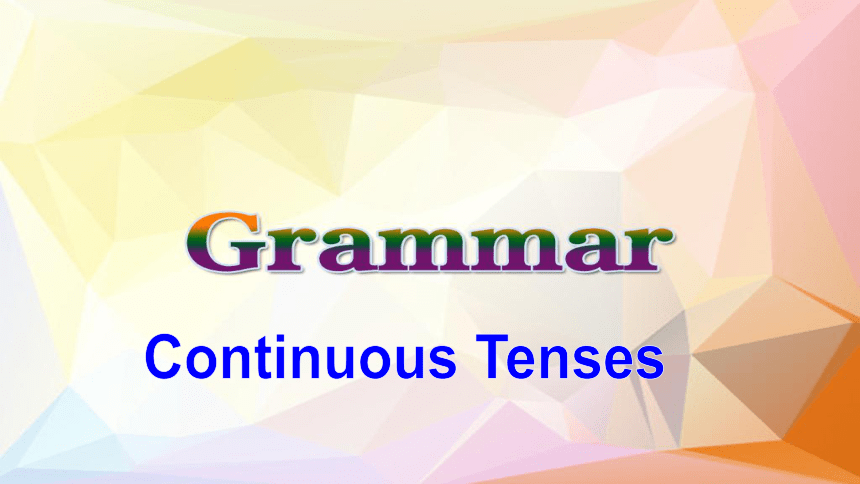

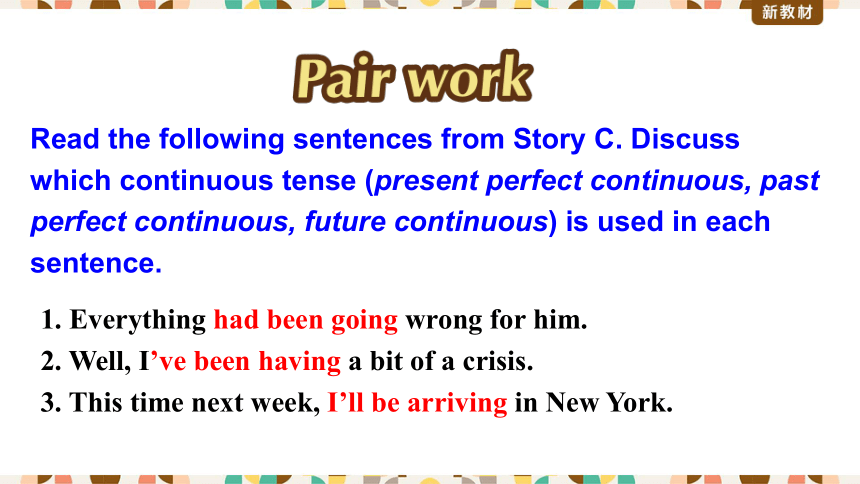
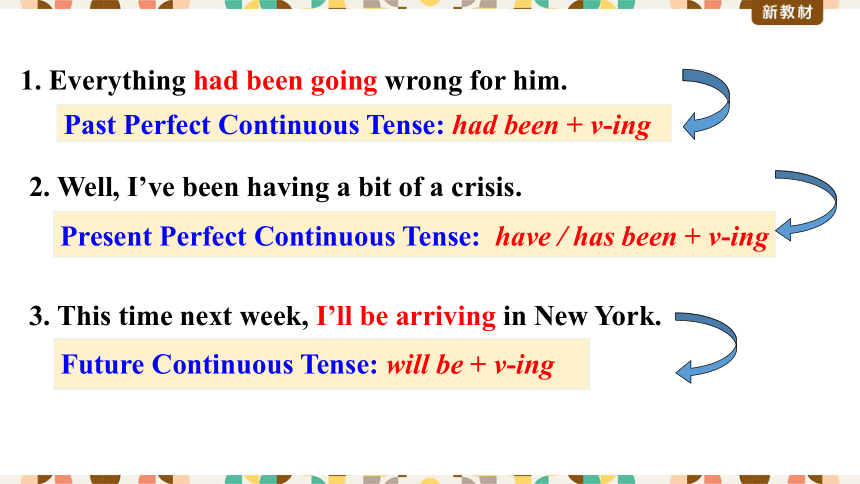
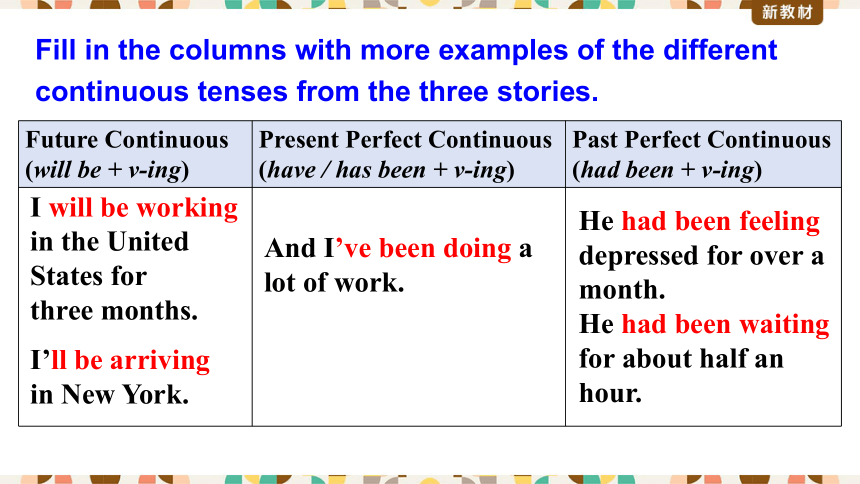
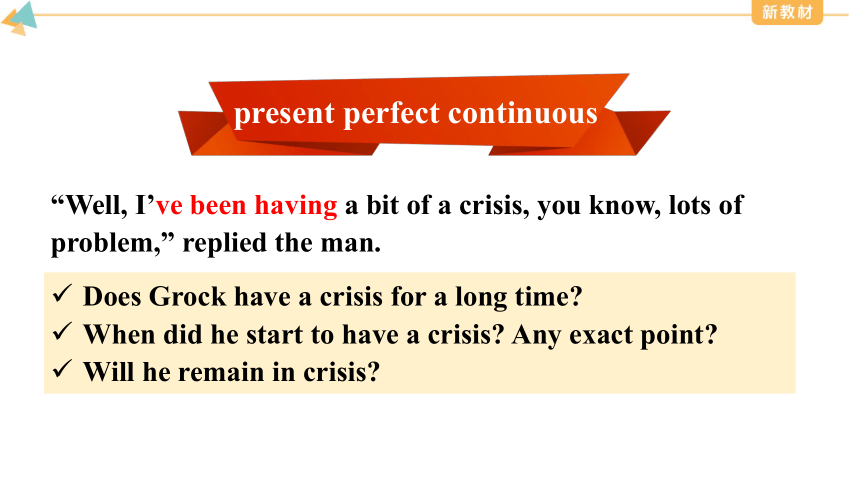

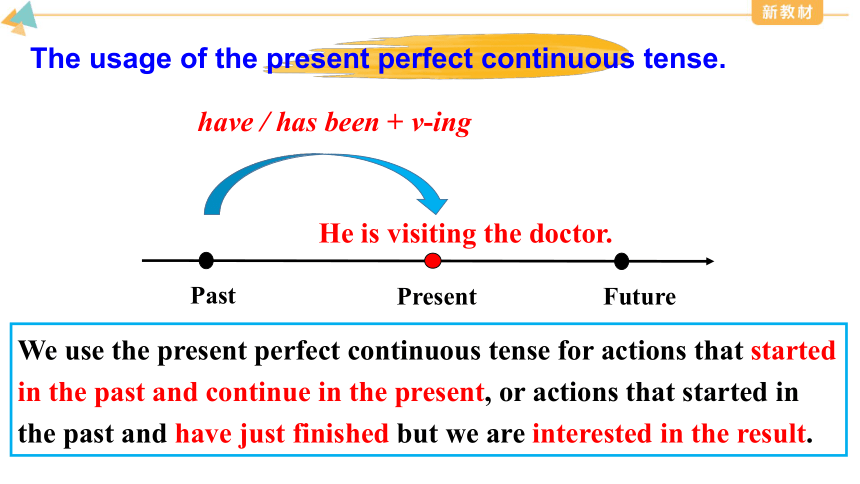
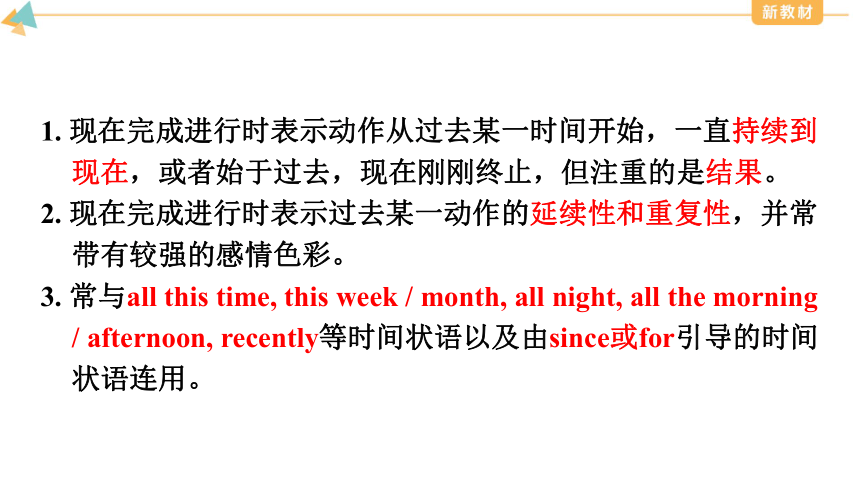
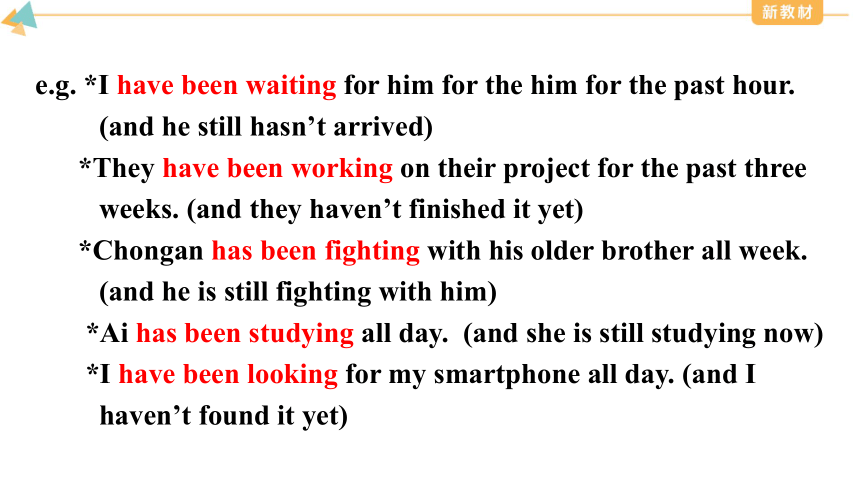
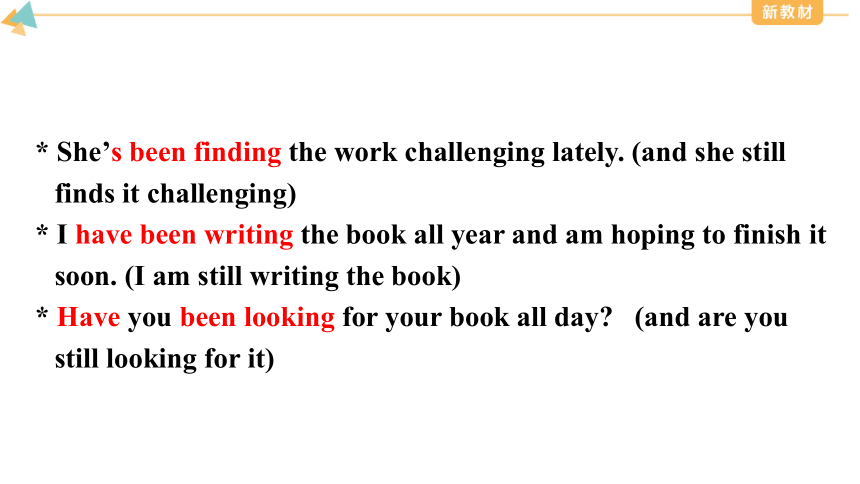
文档简介
(共30张PPT)
Unit 4 Humour
Continuous Tenses
1. To learn to use continuous tenses.
2. To practice continuous tenses in different situations.
3. To create stories using continuous tenses.
Read the following sentences from Story C. Discuss which continuous tense (present perfect continuous, past perfect continuous, future continuous) is used in each sentence.
1. Everything had been going wrong for him.
2. Well, I’ve been having a bit of a crisis.
3. This time next week, I’ll be arriving in New York.
Past Perfect Continuous Tense: had been + v-ing
Present Perfect Continuous Tense: have / has been + v-ing
Future Continuous Tense: will be + v-ing
1. Everything had been going wrong for him.
2. Well, I’ve been having a bit of a crisis.
3. This time next week, I’ll be arriving in New York.
Fill in the columns with more examples of the different continuous tenses from the three stories.
Future Continuous (will be + v-ing) Present Perfect Continuous (have / has been + v-ing) Past Perfect Continuous
(had been + v-ing)
And I’ve been doing a lot of work.
He had been feeling depressed for over a month.
He had been waiting for about half an hour.
I will be working in the United States for
three months.
I’ll be arriving in New York.
“Well, I’ve been having a bit of a crisis, you know, lots of problem,” replied the man.
Does Grock have a crisis for a long time
When did he start to have a crisis Any exact point
Will he remain in crisis
present perfect continuous
“I’ve been doing a lot of work.”
Did he work a lot for long time in the recent past before he visited the doctor
What is the consequence of his doing so much work
Past
Present
Future
He is visiting the doctor.
The usage of the present perfect continuous tense.
have / has been + v-ing
We use the present perfect continuous tense for actions that started in the past and continue in the present, or actions that started in the past and have just finished but we are interested in the result.
1. 现在完成进行时表示动作从过去某一时间开始,一直持续到现在,或者始于过去,现在刚刚终止,但注重的是结果。
2. 现在完成进行时表示过去某一动作的延续性和重复性,并常带有较强的感彩。
3. 常与all this time, this week / month, all night, all the morning / afternoon, recently等时间状语以及由since或for引导的时间状语连用。
e.g. *I have been waiting for him for the him for the past hour. (and he still hasn’t arrived)
*They have been working on their project for the past three weeks. (and they haven’t finished it yet)
*Chongan has been fighting with his older brother all week. (and he is still fighting with him)
*Ai has been studying all day. (and she is still studying now)
*I have been looking for my smartphone all day. (and I haven’t found it yet)
* She’s been finding the work challenging lately. (and she still finds it challenging)
* I have been writing the book all year and am hoping to finish it soon. (I am still writing the book)
* Have you been looking for your book all day (and are you still looking for it)
So, after he had been feeling depressed for over a month, he decided to go to the doctor.
Did he feel depressed for a long time before he went to see the doctor
When did he start to feel that way Any exact point
Would this state end very soon
past perfect continuous
Finally, after he had been waiting for about half an hour, he was called in for his consultation.
Did he wait for long time before he was finally called in
When did he begin to wait Any exact point
Past
Present
Future
We use the past perfect continuous tense to describe an ongoing action that started in the past and continued for some time in the past.
The usage of the past perfect continuous tense.
had been + v-ing
1. 过去完成进行时表示过去某时开始并持续到过去某时的动作。
2. 过去完成进行时还可以表示某动作在过去某段时间内反复进行。
3. 过去完成进行时必须以一个过去的时间为前提,可与when从句(该从句用一般过去时)连用。
4. 过去完成进行时还常用于间接引语中。
e.g. * I had been walking around all morning before I found her.
* We had been trying to find the right road for nearly and hour before we finally spotted it.
* They had been watching the series for three months.
* She had been asking for help but no one took any notice.
* Everything was damp as it had been raining all day.
* She had passed the exam with flying colours because she had been studying very hard throughout the year.
* We had been waiting for him over an hour when he finally arrived.
Don’t come at eleven because I will be babysitting my niece.
By this time next month, we will be lying on the beach sunbathing.
You uncle will be visiting us for the holidays.
When do these activities happen
Will they last for some time in the future
future continuous
Past
Present
Future
The usage of the future continuous tense.
will be+ v-ing
We use the future continuous tense to talk about an action that will be in progress (an ongoing or continued action) at some time in the future.
1. 将来进行时表示在将来某一时间正在进行的动作。
2. 将来进行时可以表示原因、结果和可能。
将来进行时表示原因时,可以用在because从句中;表示结果时,常与条件从句连用;表示可能时,说话人往往有“我料想”或“我估计”的含义。
3. 将来进行时表示委婉的语气。
e.g. * Will you be using your textbook tomorrow
* If I don’t finish this now, I’ll still be reading it next year!
* We will be learning about Galileo Galilei next year.
Use the cues in brackets and the present perfect continuous tense to explain the situations.
1. Their clothes are muddy. (play football)
2. He should go to see a doctor. (cough a lot)
3. The mother looks anxious. (looking for her missing son)
4. Joey will win the coming singing competition. (practice singing every day)
e.g. Their clothes are muddy because they have been playing football all day.
Use the cues in brackets and the past perfect continuous tense to explain the situations.
1. Their clothes were muddy. (play football)
2. He went to see a doctor. (cough a lot)
3. The mother looked anxious. (looking for her missing son)
4. Joey won the coming singing competition. (practice singing every day)
e.g. Their clothes were muddy because they had been playing football all day.
Make up two dialogues with your partner by using the future continuous tense.
A: I think that in 2030, you’ll be working in a university.
B: Really I think I will be working abroad as an engineer.
1. The eager fans ___________________ (wait) for six hours before they finally got the tickets for the football match.
2. I ___________________ (look for) that for weeks — where did you find it
3. Mrs Wang _____________________________ (stay with her friends) when she goes to Hainan.
Complete the sentences using present continuous, past perfect continuous or future continuous where appropriate.
had been waiting
had been looking for
will be staying with her friends
4. As he ________________________ (repair his car) all afternoon, he was messy.
5. This book is taking me so long that I _____________________ (still read) it by this time next year!
6. She ________________________ (study English) since she left school.
had been repairing his car
will be still reading
has been studying English
1. —I’m sure Joey will win the first prize in the coming singing competition.
—I agree. He ___________________ (prepare) for it for months. And listen, he is practicing singing now.
2. He __________________ (cough) a lot. He should go to see a doctor.
3. My dog is missing. I _____________________ (look for) it recently and still haven’t found it.
用括号内(短语)动词的正确形式填空。
has been preparing
has been coughing
have been looking for
4. I ________________ (wait) here for an hour before she called on me.
5. The telephone ________________ (ring) for minutes before it was answered.
had been waiting
had been ringing
6. A: Is it next week that you’re on holiday
B: Yes. This time next week I ____________(sail) on the Pacific.
7. A: It _____________ (rain) all day on Sunday, so the party will be in the house, not in the garden.
B: I think the party in the house won’t be so boring.
will be sailing
will be raining
Create a funny story using the three continuous tenses.
Unit 4 Humour
Continuous Tenses
1. To learn to use continuous tenses.
2. To practice continuous tenses in different situations.
3. To create stories using continuous tenses.
Read the following sentences from Story C. Discuss which continuous tense (present perfect continuous, past perfect continuous, future continuous) is used in each sentence.
1. Everything had been going wrong for him.
2. Well, I’ve been having a bit of a crisis.
3. This time next week, I’ll be arriving in New York.
Past Perfect Continuous Tense: had been + v-ing
Present Perfect Continuous Tense: have / has been + v-ing
Future Continuous Tense: will be + v-ing
1. Everything had been going wrong for him.
2. Well, I’ve been having a bit of a crisis.
3. This time next week, I’ll be arriving in New York.
Fill in the columns with more examples of the different continuous tenses from the three stories.
Future Continuous (will be + v-ing) Present Perfect Continuous (have / has been + v-ing) Past Perfect Continuous
(had been + v-ing)
And I’ve been doing a lot of work.
He had been feeling depressed for over a month.
He had been waiting for about half an hour.
I will be working in the United States for
three months.
I’ll be arriving in New York.
“Well, I’ve been having a bit of a crisis, you know, lots of problem,” replied the man.
Does Grock have a crisis for a long time
When did he start to have a crisis Any exact point
Will he remain in crisis
present perfect continuous
“I’ve been doing a lot of work.”
Did he work a lot for long time in the recent past before he visited the doctor
What is the consequence of his doing so much work
Past
Present
Future
He is visiting the doctor.
The usage of the present perfect continuous tense.
have / has been + v-ing
We use the present perfect continuous tense for actions that started in the past and continue in the present, or actions that started in the past and have just finished but we are interested in the result.
1. 现在完成进行时表示动作从过去某一时间开始,一直持续到现在,或者始于过去,现在刚刚终止,但注重的是结果。
2. 现在完成进行时表示过去某一动作的延续性和重复性,并常带有较强的感彩。
3. 常与all this time, this week / month, all night, all the morning / afternoon, recently等时间状语以及由since或for引导的时间状语连用。
e.g. *I have been waiting for him for the him for the past hour. (and he still hasn’t arrived)
*They have been working on their project for the past three weeks. (and they haven’t finished it yet)
*Chongan has been fighting with his older brother all week. (and he is still fighting with him)
*Ai has been studying all day. (and she is still studying now)
*I have been looking for my smartphone all day. (and I haven’t found it yet)
* She’s been finding the work challenging lately. (and she still finds it challenging)
* I have been writing the book all year and am hoping to finish it soon. (I am still writing the book)
* Have you been looking for your book all day (and are you still looking for it)
So, after he had been feeling depressed for over a month, he decided to go to the doctor.
Did he feel depressed for a long time before he went to see the doctor
When did he start to feel that way Any exact point
Would this state end very soon
past perfect continuous
Finally, after he had been waiting for about half an hour, he was called in for his consultation.
Did he wait for long time before he was finally called in
When did he begin to wait Any exact point
Past
Present
Future
We use the past perfect continuous tense to describe an ongoing action that started in the past and continued for some time in the past.
The usage of the past perfect continuous tense.
had been + v-ing
1. 过去完成进行时表示过去某时开始并持续到过去某时的动作。
2. 过去完成进行时还可以表示某动作在过去某段时间内反复进行。
3. 过去完成进行时必须以一个过去的时间为前提,可与when从句(该从句用一般过去时)连用。
4. 过去完成进行时还常用于间接引语中。
e.g. * I had been walking around all morning before I found her.
* We had been trying to find the right road for nearly and hour before we finally spotted it.
* They had been watching the series for three months.
* She had been asking for help but no one took any notice.
* Everything was damp as it had been raining all day.
* She had passed the exam with flying colours because she had been studying very hard throughout the year.
* We had been waiting for him over an hour when he finally arrived.
Don’t come at eleven because I will be babysitting my niece.
By this time next month, we will be lying on the beach sunbathing.
You uncle will be visiting us for the holidays.
When do these activities happen
Will they last for some time in the future
future continuous
Past
Present
Future
The usage of the future continuous tense.
will be+ v-ing
We use the future continuous tense to talk about an action that will be in progress (an ongoing or continued action) at some time in the future.
1. 将来进行时表示在将来某一时间正在进行的动作。
2. 将来进行时可以表示原因、结果和可能。
将来进行时表示原因时,可以用在because从句中;表示结果时,常与条件从句连用;表示可能时,说话人往往有“我料想”或“我估计”的含义。
3. 将来进行时表示委婉的语气。
e.g. * Will you be using your textbook tomorrow
* If I don’t finish this now, I’ll still be reading it next year!
* We will be learning about Galileo Galilei next year.
Use the cues in brackets and the present perfect continuous tense to explain the situations.
1. Their clothes are muddy. (play football)
2. He should go to see a doctor. (cough a lot)
3. The mother looks anxious. (looking for her missing son)
4. Joey will win the coming singing competition. (practice singing every day)
e.g. Their clothes are muddy because they have been playing football all day.
Use the cues in brackets and the past perfect continuous tense to explain the situations.
1. Their clothes were muddy. (play football)
2. He went to see a doctor. (cough a lot)
3. The mother looked anxious. (looking for her missing son)
4. Joey won the coming singing competition. (practice singing every day)
e.g. Their clothes were muddy because they had been playing football all day.
Make up two dialogues with your partner by using the future continuous tense.
A: I think that in 2030, you’ll be working in a university.
B: Really I think I will be working abroad as an engineer.
1. The eager fans ___________________ (wait) for six hours before they finally got the tickets for the football match.
2. I ___________________ (look for) that for weeks — where did you find it
3. Mrs Wang _____________________________ (stay with her friends) when she goes to Hainan.
Complete the sentences using present continuous, past perfect continuous or future continuous where appropriate.
had been waiting
had been looking for
will be staying with her friends
4. As he ________________________ (repair his car) all afternoon, he was messy.
5. This book is taking me so long that I _____________________ (still read) it by this time next year!
6. She ________________________ (study English) since she left school.
had been repairing his car
will be still reading
has been studying English
1. —I’m sure Joey will win the first prize in the coming singing competition.
—I agree. He ___________________ (prepare) for it for months. And listen, he is practicing singing now.
2. He __________________ (cough) a lot. He should go to see a doctor.
3. My dog is missing. I _____________________ (look for) it recently and still haven’t found it.
用括号内(短语)动词的正确形式填空。
has been preparing
has been coughing
have been looking for
4. I ________________ (wait) here for an hour before she called on me.
5. The telephone ________________ (ring) for minutes before it was answered.
had been waiting
had been ringing
6. A: Is it next week that you’re on holiday
B: Yes. This time next week I ____________(sail) on the Pacific.
7. A: It _____________ (rain) all day on Sunday, so the party will be in the house, not in the garden.
B: I think the party in the house won’t be so boring.
will be sailing
will be raining
Create a funny story using the three continuous tenses.
同课章节目录
- Unit 4 Humour
- Lesson 1 What’s So Funny?
- Lesson 2 Why Do We Need Humour?
- Lesson 3 My Favourite Comedian
- Unit 5 Education
- Lesson 1 Enlightening a Mind
- Lesson 2 The Objectives of Education
- Lesson 3 Understanding
- Unit 6 The Media
- Lesson 1 From Page to Screen
- Lesson 2 Questions about Media
- Lesson 3 The Advertising Game
